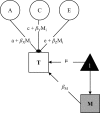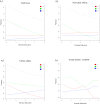Does the heritability of cognitive abilities vary as a function of parental education? Evidence from a German twin sample
- PMID: 29738571
- PMCID: PMC5940208
- DOI: 10.1371/journal.pone.0196597
Does the heritability of cognitive abilities vary as a function of parental education? Evidence from a German twin sample
Abstract
A well-known hypothesis in the behavioral genetic literature predicts that the heritability of cognitive abilities is higher in the presence of higher socioeconomic contexts. However, studies suggest that the effect of socioeconomic status (SES) on the heritability of cognitive ability may not be universal, as it has mostly been demonstrated in the United States, but not in other Western nations. In the present study we tested whether the importance of genetic and environmental effects on cognitive abilities varies as a function of parental education in a German twin sample. Cognitive ability scores (general, verbal, and nonverbal) were obtained on 531 German twin pairs (192 monozygotic, 339 dizygotic, ranging from 7 to 14 years of age; Mage = 10.25, SD = 1.83). Data on parental education were available from mothers and fathers. Results for general cognitive ability and nonverbal ability indicated no significant gene x parental education interaction effect. For verbal ability, a significant nonshared environment (E) x parental education interaction was found in the direction of greater nonshared environmental influences on verbal abilities among children raised by more educated parents.
Conflict of interest statement
Figures


Similar articles
-
Interaction between Parental Education and Twin Correlations for Cognitive Ability in a Norwegian Conscript Sample.Behav Genet. 2017 Sep;47(5):507-515. doi: 10.1007/s10519-017-9857-z. Epub 2017 Jul 25. Behav Genet. 2017. PMID: 28744605 Free PMC article.
-
Does parental education have a moderating effect on the genetic and environmental influences of general cognitive ability in early adulthood?Behav Genet. 2010 Jul;40(4):438-46. doi: 10.1007/s10519-010-9351-3. Epub 2010 Mar 19. Behav Genet. 2010. PMID: 20300818 Free PMC article.
-
The heritability of memory in the Western Reserve Twin Project.Behav Genet. 1994 Mar;24(2):155-60. doi: 10.1007/BF01067819. Behav Genet. 1994. PMID: 8024532
-
Genetic and environmental etiology of the relationship between childhood hyperactivity/inattention and conduct problems in a South Korean twin sample.Twin Res Hum Genet. 2015 Jun;18(3):290-7. doi: 10.1017/thg.2015.26. Epub 2015 Apr 30. Twin Res Hum Genet. 2015. PMID: 25926162 Review.
-
Is optimism heritable? A study of twins.Behav Res Ther. 1993 Jul;31(6):569-74. doi: 10.1016/0005-7967(93)90108-7. Behav Res Ther. 1993. PMID: 8347115 Review.
Cited by
-
Protective genes and pathways in Alzheimer's disease: moving towards precision interventions.Mol Neurodegener. 2021 Apr 29;16(1):29. doi: 10.1186/s13024-021-00452-5. Mol Neurodegener. 2021. PMID: 33926499 Free PMC article. Review.
-
Parent-offspring resemblance for educational attainment reduces with increased social class in a global sample: evidence for the compensatory advantage hypothesis.Front Psychol. 2024 Jan 3;14:1289109. doi: 10.3389/fpsyg.2023.1289109. eCollection 2023. Front Psychol. 2024. PMID: 38235275 Free PMC article.
-
A Longitudinal Analysis of Gene x Environment Interaction on Verbal Intelligence Across Adolescence and Early Adulthood.Behav Genet. 2023 Jul;53(4):311-330. doi: 10.1007/s10519-023-10145-y. Epub 2023 May 12. Behav Genet. 2023. PMID: 37171531
-
Socioeconomic status amplifies genetic effects in middle childhood in a large German twin sample.Intelligence. 2019 Jan-Feb;72:20-27. doi: 10.1016/j.intell.2018.11.006. Epub 2018 Nov 23. Intelligence. 2019. PMID: 31435119 Free PMC article.
References
-
- Kan K-J, Wicherts JM, Dolan CV, van der Maas HLJ. On the nature and nurture of intelligence and specific cognitive abilities: The more heritable, the more culture dependent. Psycholo Sci. 2013;24:2420–2428. - PubMed
-
- Tucker-Drob EM, Briley DA, Harden KP. Genetic and environmental influences on cognition across development and context. Curr Dir Psychol Sci. 2013;22:349–55. doi: 10.1177/0963721413485087 - DOI - PMC - PubMed
-
- Turkheimer E, Beam CR, Sundet JM, Tambs K. Interaction between parental education and twin correlations for cognitive ability in a Norwegian conscript sample. Behav Genet. 2017;47:507–15. doi: 10.1007/s10519-017-9857-z - DOI - PMC - PubMed
-
- Plomin R, DeFries JC, Knopik VS, Neiderhiser JM. Behavioral genetics New York: Worth Publishers; 2013.
-
- Dick DM. Gene-environment interaction in psychological traits and disorders. Annu Rev Clin Psychol. 2011;383–409. doi: 10.1146/annurev-clinpsy-032210-104518 - DOI - PMC - PubMed
Publication types
MeSH terms
Grants and funding
LinkOut - more resources
Full Text Sources
Other Literature Sources

